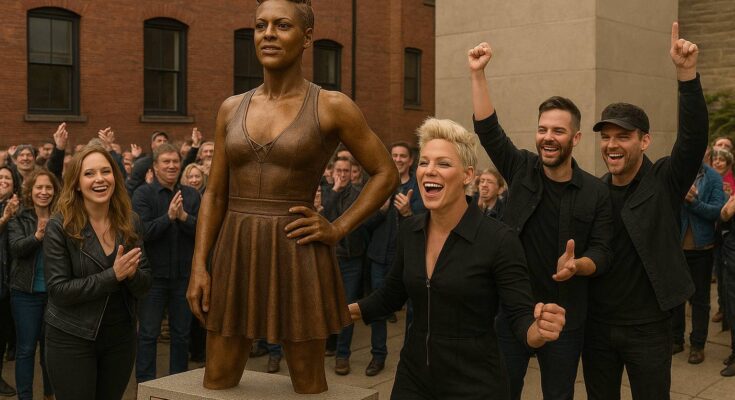P!nk, whose real name is Alecia Beth Moore, has always been bigger than life; her powerful voice, bold demeanor, and unreserved honesty have made her one of the most significant pop
Alecia Beth Moore was born on a late summer day, September 8, 1979, in Doylestown, Pennsylvania. Asthma shadowed her childhood, but it never muted her spirit. Her parents divorced before she turned ten, leaving her to navigate a childhood layered with longing and defiance. She grew up training as a gymnast from age four to twelve, flips and routines molding a foundation for both body and soul, the kind of resilience she’d later flip into a trapeze‑powered pop anthem
By her early teens, Alecia was already performing in Philadelphia nightclubs, her voice raw with emotion, her presence unfiltered. At fifteen, she joined the girl group Choice—bright dreams and bright lights—but the band dissolved without making a splash, save for a song featured on a movie soundtrack. L.A. Reid eventually told her: go solo or go home. She went solo
Her first album, Can’t Take Me Home, dropped in April 2000 and introduced Alecia Moore to the world as P!nk, an R&B-pop hybrid who refused to be neatly packaged. Produced by industry heavyweights like Babyface, the album boasted hits like “There You Go” and “Most Girls.” It shot to double‑platinum status in the U.S. and planted a flag that said: I’m here, and I’m not your cookie-cutter pop princes
But P!nk wanted more. She wanted to break molds, crack facades. She turned to pop-rock on her second album Missundaztood, releasing it in 2001. It sold some 13 million copies worldwide and punched out top‑ten singles like “Get the Party Started,” “Just Like a Pill,” and “Don’t Let Me Get Me.” She had her hit, but more importantly, she had her voice
Her rise was rapid, but no smooth ride. She landed her first Grammy with a glittering cover of “Lady Marmalade,” alongside Christina Aguilera, Lil’ Kim, and Mýa—a kind of confessional, badass sisterhood on steroids that won Best Pop Collaboration with Vocals and dominated charts around the world
Her third album, Try This, hit in 2003. It didn’t sell as well as Missundaztood, but it earned her a Grammy for Best Female Rock Performance—proof that even when the world didn’t catch fire, she still burned bright enough to merit accolades
She rebounded with I’m Not Dead (2006), bringing vulnerability and vengeance in equal parts. “Who Knew” and “U + Ur Hand” climbed charts and resonated with anyone who ever wrestled with shame or resentment or the need to break free. Then came Funhouse (2008), a fierce, theatrical record born out of heartbreak, with “So What” punching through pain with spitfire defiance. She toured wide, singing upside down, blindfolded even—acrobatics met anthem, her body and voice doing aerial somersaults she once only dared dreaming aloud
In 2012, The Truth About Love took her deeper still. The hits kept coming: “Blow Me (One Last Kiss),” “Try,” “Just Give Me a Reason” (a duet that scored a US number one), “True Love,” “Walk of Shame,” and “Are We All We Are.” It was her first album to top the Billboard 200, and it felt like her owning the story her way
2014 brought a pivot—one of many. She joined forces with Dallas Green (City and Colour) under the folk duo You+Me. Together, they made rose ave., a tender, acoustic album born of friendship, simplicity, and a break from pop stardom’s glare. It was a reminder: stripped-down honesty, no pyrotechnics needed, still says so much
She never slowed. Beautiful Trauma (2017) and Hurts 2B Human (2019) continued her streak, both debuting at No. 1 on the Billboard 200—proof that her evolution never diluted her power, only deepened it . And then there’s Trustfall, her most recent studio album released in 2023, debuting at No. 2. Her discography is a timeline of reinvention and reveal, her career a defiance wrapped in melody, beat, and whirlwind choreography
By now, she’s sold more than 135 million records—60 million albums, 75 million singles—ranking as one of the best-track-selling artists on Earth. She’s the most-played female solo act in the UK in the 21st century, Billboard crowned her Pop Songs Artist of the 2000s, and her string of awards spans Grammys, BRITs, MTV Video Music Awards—including the Michael Jackson Video Vanguard Award—Daytime Emmys, Billboard honors like Woman of the Year and Icon and Legend of Live, and the BMI President’s Award for songwriting and cultural impact. VH1 even ranked her among the 100 Greatest Women in Music. And if you cruise down Hollywood, you’ll find her star shining bright in the Walk of Fame
Behind the albums and awards, there’s more to Pink than the pop-rock persona. She’s the daughter of an Irish-German-Lithuanian-Jewish mother, her roots threading with identity and meaning. Her childhood lyrics were the kind a mother would call “introspective. Some of it was very black, and very deep.” She wrote to bleed, to feel, before she ever sang to fill stadiums
Her voice is a low-altitude roar. Critics call it “raspy,” “husky,” a “powerhouse.” She’s a contralto, and her voice carries emotional freight: the disappointment in “Family Portrait,” the regret in “Who Knew,” the comforting lie in “Perfect”
Visually, P!nk has always courted the edges. Her hairstyle choices—from neon spikes to pink-drenched dreadlocks to a skater cut—mirror the androgynous, gender-bending aesthetic she embodies. She once joked she was a tomboy-hippie-gangster hybrid; Billboard declared her style adventurous, unapologetic
Beyond music, Pink has pushed for change. She’s an ally for LGBTQ rights—her song “Dear Mr. President” canceled George W. Bush’s anti-gay stance with righteous fury. She marched against Proposition 8, earned an Ally for Equality award, and says one day weddings shouldn’t be labeled as ‘gay’—just weddings
Animal rights? She’s in. She said no to performing at Prince William’s birthday due to his family’s hunting stance. She’s done PETA campaigns, publicly raised mulesing concerns, even posed nude for “I’d Rather Go Naked Than Wear Fur”
Philanthropy is handwritten in her DNA. Appointed a UNICEF ambassador, she visited Haiti, talked advocacy on stage, projects tied to her tours. She and her husband raised $2 million for No Kid Hungry via a bike ride, helped COVID‑impacted kids, donated to bushfire victims and hospitals, and even paid fines for Norway’s women’s beach handball team when they wore shorts instead of bikini bottoms. She released a protest song in 2022 with proceeds going to Michelle Obama’s “When We All Vote” initiative. She’s also given away books to combat censorship. She never just sings causes — she weaves action into her platform
Her personal life is as vivid as her stage life. She met motocross star Carey Hart at the 2001 X Games. Their engagement was written on a pit board mid-race—“Will U Marry Me? Serious!”—the staccato of love and adrenaline captured in that cheeky gesture. They separated, reunited, separated, reunited again. Their story wove through her songwriting—songs like “So What” aired that tension—and through public reconciliation
They’ve got two kids: Willow Sage (born June 2011) and son Jameson Moon (born December 2016). Willow even got to sing with her mother—“Cover Me in Sunshine” delivered generational harmony and joy in 2021
She’s also shown raw honesty navigating the pandemic. Diagnosed with COVID-19, she and her son recovered, and she donated $1 million to healthcare workers. When she accepted the People’s Champion Award in 2019, she reminded us that “kindness today is an act of rebellion.” That encapsulates her. She doesn’t just perform; she propels
Through it all, Pink is a contradiction in harmony. She’s unfiltered and vulnerable. She’s acrobatic and grounded. She’s a rocker with a delicate soul. Her catalog is a rollercoaster of ache-hymn anthems, and her life expands the meaning of being bigger than life. She’s never just singing: she’s standing, protesting, flipping—onto a stage or into your fist, with the raw power of a contralto that says, This is me. And this is what being alive, being honest, being Pink, means.



